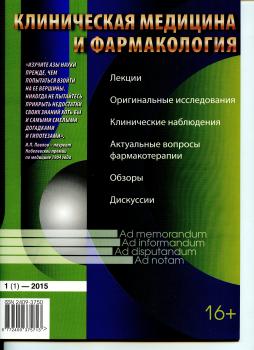Russian Federation
Tula, Tula, Russian Federation
Tula, Tula, Russian Federation
As a result of immunohistochemical studies, markers of inflammation are determined (plasma cells-CD138+, natural killers-CD56+, CD16+, cytotoxic T-lymphocytes-CD8+, T-helper cells-CD4+, histocompatibility complex HLADR (II)+). They confirm the presence of inflammation and changes in local immunity. Post-infectious imbalance of the immune system causes autoimmune aggression to implantation of the fetal egg after embryotransfer into the uterine cavity in fresh and cryoprotocols during assisted reproductive technologies. 107 infertile women with a history of several unsuccessful attempts at in vitro fertilization were treated. They have chronic endometritis with autoimmune disorders using immunohistochemical research. Classical drug therapy was performed, without the use of antibiotics. In order to improve the quality of medical treatment, the therapy package includes local effects on the endometrium by introducing the immunomodulator "Gepon"into the uterine cavity. The women were divided into two groups: in group I (n=55), patients were administered intra — cavity injection of the drug "Gepon"into the uterus. In group II (n=50), this drug was not used. At the end of therapy, an immunohistochemical study was monitored. In the treatment of chronic endometritis with autoimmune disorders, positive dynamics was observed in group I women (I-93.1%; II-67.3%; p<0.05). There was a balance of immunocompetent cells, increased sensitivity of endometrial receptors to hormonal regulation. The endometrial thickness was restored in accordance with the stage and phase of the menstrual cycle. When analyzing the expression of endometrial cell markers CD16+, CD56+ and HLA-DR (II)+ — in all patients of the control group, no changes were observed, and plasma cells were absent. The obtained results indicate that the use of the complex therapy of chronic endometritis with autoimmune disorders-the local effect of the immunomodulator "Gepon", which accelerates the restoration of the balance of mmunocompetent cells, blocking autoimmune aggression in the endometrium.
autoimmune disorders, chronic endometritis, immunocompetent cells, post-infectious imbalance, local immunity, autoimmune aggression, immunomodulator "Gepon", embryotransfer
1. Burlev V.A., Il'yasova N.A., Shishkanova O.L. Ciklicheskiy angiogenez eutopicheskogo endometriya (obzor literatury) // Problemy reprodukcii. -2006. - № 6 - S. 22-30. DOIhttps://doi.org/10.17116/rosakush201616537-41
2. Kolesnichenko A.A., Petrov Yu.A. Hronicheskiy endometrit i nevynashivanie beremennosti // Mezh-dunarodnyy zhurnal prikladnyh i fundamental'nyh issledovaniy. - 2019. - № 10-2. - S. 313-317.
3. Mal'ceva L.I., Sharipova R.I., Zhelezova M.E. Hronicheskiy endometrit - smena privychnyh pred-stavleniy. Prakticheskaya medicina. 2018. - Tom 16, № 6. - S. 99-105. DOI:https://doi.org/10.32000/2072-1757-2018-16-6-99-10588
4. Mihnina E.A., Ellinidi V.N., Kalinina N.M., Davydova N.I. Sposob diagnostiki hronicheskogo endometrita i haraktera vospaleniya (patent RF № 2236013), 2007.
5. Ovcharuk E.A., Habarov S.V., Hadarceva K.A. Lokal'noe vvedenie liposomal'noy emul'sii «Flame-na» v lechenii hronicheskogo endometrita s autoimmunnoy dezadaptaciey // Vestnik novyh medicinskih tehnologiy. - 2018. - T. 25, № 3. - S. 87-95. DOI:https://doi.org/10.24411/1609-2163-2018-16234
6. Ovcharuk E.A., Hadarceva K.A. Bakteriologicheskaya i gistologicheskaya diagnostika hronicheskogo endometrita pri besplodii // Vestnik novyh medicinskih tehnologiy. 2010. №1. C. 181-182.
7. Ovcharuk E.A., Hadarceva K.A., Ovcharuk V.L. Hronicheskie autoimmunnye endometrity: diagnosti-ka i lechenie (kratkoe soobschenie) // Vestnik novyh medicinskih tehnologiy. Elektronnoe izdanie. 2013. №1. Publikaciya 2-198. URL:http://medtsu.tula.ru/VNMT/Bulletin/E2013-1/4589.pdf (data obrascheniya 02.12.2013).
8. Orazov M.R., Radzinskiy V.E., Hamoshina M.B., Kaygorodova L.A., Toktar L.R., Pokul' L.V., Tulu-pova M.S. «Tonkiy» endometriy - sovremennyy vzglyad na problemu // Farmateka. - 2018. - № 6 (359). - S. 15-22.
9. Radzinskiy V.E., Petrov Yu.A., Kalinina E.A., Shirokova D.V., Polina M.L. Patogeneticheskie oso-bennosti makrotipov hronicheskogo endometrita // Kazanskiy medicinskiy zhurnal, -2017. - T. 98, №1. S. - 27-34. DOI:https://doi.org/10.17750/KMJ2017-27
10. Serebrennikova K.G., Arutyunyan N.A., Alehin A.I. Diagnostika i klinicheskie kriterii hroniche-skogo endometrita. Ginekologiya. - 2018. - № 20(6). - S. 53-59. DOI:https://doi.org/10.26442/20795696.2018.6.180070
11. Habarov S.V., Hadarceva K.A. Vozrastnye aspekty v neudachah programm vspomogatel'nyh repro-duktivnyh tehnologiy // Vestnik novyh medicinskih tehnologiy. Elektronnoe izdanie. 2018. №2. Publi-kaciya 1-11.URL:http://www.medtsu.tula.ru/VNMT/Bulletin/E2018-2/1-21.pdf (data obrascheniya: 18.04.2018). DOI:https://doi.org/10.24411/2075-4094-2018-16041
12. Ellinidi V.N., Feoktistov A.A., Obidnyak D.M., Lyamina A.V., Suvorova I.Yu. Hronicheskiy poli-poidnyy i limfofollikulyarnyy endometrit: gisteroskopicheskaya i gistologicheskaya diagnostika. // Zhur-nal akusherstva i zhenskih bolezney. - 2017. T. 66, № 6. - S. 59-65. DOI:https://doi.org/10.17816/JOWD66659-65
13. Yakovchuk E.K., Sulima A.N., Rybalka A.N., Dizha M.A., Anikin S.S., Simacheva S.A. Hronicheskiy endometrit: sovremennoe sostoyanie problemy, osnovnye aspekty patogeneza, vliyanie na reproduktivnuyu funkciyu // Rossiyskiy vestnik akushera-ginekologa. - 2016. - № 16(5). - S. 37-41. DOI:https://doi.org/10.17116/rosakush201616537-41
14. Benner M., Ferwerda G., Joosten I., van der Molen R.G. How uterine microbiota might be responsible for a receptive, fertile endometrium // Hum Reprod Update 2018;24(4):393-415. DOI: 10.1093 / humupd / dmy012
15. Crha I., Ventruba P., Žáková J., Ješeta M., Pilka R., Lousová E., Papíková Z. Uterine microbiome and en-dometrial receptivity. Děložní mikrobiom jako faktor receptivity endometria // Ceska Gynekol. 2019;84(1):49-54.
16. Kitaya K, Yasuo T. Immunohistochemistrical and clinicopathological characterization of chronic endome-tritis // Am J Reprod Immunol. 2011; 66 (5): 410-5.
17. Moreno I., Codoñer F.M., Vilella F., Valbuena D., Martinez-Blanch J.F., Jimenez-Almazán J., Alonso R., Alamá P., Remohí J., Pellicer A., Ramon D., Simon C. Evidence that the endometrial microbiota has an effect on implantation success or failure // Am. J. Obstet. Gynecol. 2016; 215(6): 684-703. DOI:https://doi.org/10.1016/j.ajog.2016.09.075
18. Wu D., Kimura F., Zheng, L., Ishida M., Niwa Y., Hirata K., Takebayashi A., Takashima A., Takahashi K., Kushima R., Zhang G., Murakami T. Chronic endometritis modifies decidualization in human endometrial stromal cells // Reprod. Biol. Endocrinol. 2017; 15(1): 16. DOIhttps://doi.org/10.1186/s12958-017-0233-x








